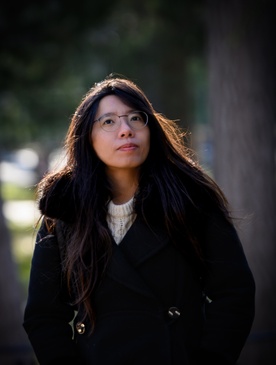Chen ("Chris") Gong is a postdoctoral researcher at the Potsdam Institute for Climate Impact Research (PIK).
Dr. Gong received her training as a physicist at the California Institute of Technology and the University of Potsdam. She is currently a member of the Energy System Lab and the Global Energy Transition Team at PIK. Her research focuses on energy transition pathways for China and India, as well as global technological pathways for the energy transition. Previously, she worked on two key topics: 1) modeling the power sector transition in long-term climate mitigation models, through iterative coupling of the integrated assessment model REMIND with the hourly power sector model DIETER (DIW); and 2) developing national transition pathways for China.
Currently, Dr. Gong is involved in two projects: one with Indian and Chinese stakeholders to design nationally determined contribution (NDC) pathways, and another focused on technology choices related to electrification and hydrogen using high-resolution hourly models. Additionally, she is working on China's power sector transition scenario, using the REMIND model in combination with the hourly multi-nodal power sector model PyPSA.
Her research interests include international and national climate policies, international collaborations to achieve ambitious climate pathways, international political economy, energy system modeling, sector coupling, renewable energy storage, hydrogen, and industrial energy transition. Dr. Gong is part of several collaborative projects, including the China Power Sector Project PANDA (with the Energy Foundation), the Indian Green Growth Pathway (with ClimateWorks), the 1.5°C National Pathways project (with Climate Analytics), and several EU Horizon projects such as NEWPATHWAYS, COMMITTED, and ELEVATE. She also contributes to Germany's energy transition project ARIADNE and the Germany-Sino collaboration project INTEGRATE.
Department
Working Group
Lab
Contact
14412 Potsdam
ORCID
Potsdam Institute for Climate Impact Research (PIK), Potsdam, Germany
I received a double degree in B.A. in mathematics from Ohio Wesleyan University and a B.Sc. degree in applied physics from California Institute of Technology in 2012. I received a M.Sc. and Ph.D. degree in Physics titled "Synchronization of coupled phase oscillators" [link] from the University of Potsdam in 2021.
Mitigation scenario pathway modeling
- Power sector model and transition scenario using REMIND and PyPSA
- Renewable energy integration, sector-coupling
- Integrated Assessment Model (IAM) REMIND
- China and India's energy transition pathway
Computational methodologies and physics
- Soft-coupling optimization problems of two-scales
- Network dynamics, coupled oscillatory systems
- Nonlinear dynamics and dynamical systems
- Theoretical astrophysics
- Theoretical biophysics
Political economy
- Greening the growth models of world economies (collaboration with Max-Planck-Institut für Gesellschaftsforschung and Brown University)
- C. C. Gong, F. Ueckerdt, C. Bertram, Y. Yin, D. Bantje, R. Pietzcker, J. Hoppe, R. Hasse, M. Pehl, S. Moreno-Leiva, J. Duerrwaechter, J. Muessel, G. Luderer, “Multi-level emission impacts of electrification and coal pathways in China's netzero transition“, preprint (2024)
- C. C. Gong, F. Ueckerdt, R. Pietzcker, A. Odenweller, W.-P. Schill, M. Kittel,
G. Luderer, “Bidirectional coupling of the long-term integrated assessment model REgional Model of INvestments and Development (REMIND) v3.0.0 with the hourly power sector model Dispatch and Investment Evaluation Tool with Endogenous Renewables (DIETER) v1.0.2”,
Geoscientific Model Development, 16, 4977–5033, (2023) - L. Baumstark, N. Bauer, [et al., including C. C. Gong, “REMIND2.1: transformation
and innovation dynamics of the energy-economic system within climate and sustainability
limits”, Geosci. Model Dev., Issue 14, 6571–6603 (2021) - C. C. Gong, R. Toenjes and A. Pikovsky, “Coupled Moebius Maps as a Tool to Model Kuramoto
Phase Synchronization”, Physical Review E, Vol 102, Issue 2, Page 022206 (2020) - C. C. Gong and A. Pikovsky, “Low-Dimensional Dynamics for Higher Order Harmonic Globally Coupled Phase Oscillator Ensemble”, Physical Review E, Vol 100, Issue 6, Page 062210 (2019)
- F. Peter, C. C. Gong and A. Pikovsky, “Microscopic Cross-correlations in the Kuramoto Model of Coupled Oscillators”, Physical Review E, Vol 100, Issue 3, Page 032210 (2019)
- C. C. Gong, C. Zheng, R. Toenjes and A. Pikovsky, “Repulsively Coupled Kuramoto-Sakaguchi Phase Oscillators Ensemble Subject to Common Noise”, Chaos, Vol 29, Issue 3, Page 033127 (2019)
- C. C. Gong, N. I. Libeskind, E. Tempel, Q. Guo, S. Gottlöber, G. Yepes, P. Wang, J. Sorce and M. Pawlowski, “The Origin of Lopsided Satellite Galaxy Distribution in Galaxy Pairs”, Monthly Notices of the Royal Astronomical Society, Vol. 488, Issue 3, Pages 3100--3108 (2019)
- C. C. Gong and S. Klumpp, “Modelling sRNA-Regulated Plasmid Maintenance”, PLoS ONE 12(1): e0169703 (2017)
- Seminar on New Research in Energy System Modelling, Teaching Assistant, Technical University Berlin, 2021/2022 Winter Semester, 2022/2023 Winter Semester
- Energy and Climate Change, Teaching Assistant, Technical University Berlin, 2020 Spring Semester
- Python Programming, Teaching Assistant, University of Potsdam, 2017/2018 Winter Semester
- Chaos Theory, Teaching Assistant, University of Potsdam, 2016 and 2017 Summer Semesters
- Nonlinear Dynamics, Teaching Assistant, University of Potsdam, 2017 Summer Semester
- Theoretical Physics II - Electrodynamics, Teaching Assistant, University of Potsdam, Oct. 2016 to Feb. 2017
- Ph7 Physics Laboratory - Experiments in Atomic and Nuclear Physics, Lab Teaching Assistant, Caltech, Apr. 2012 to June 2012






